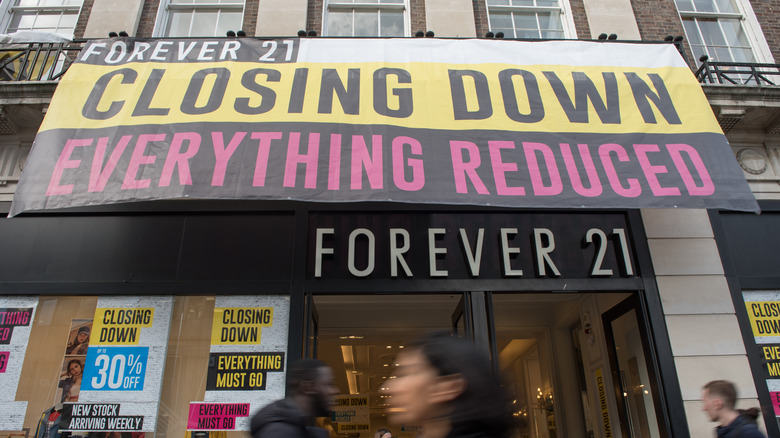These US States Have The Highest Bankruptcy Rates In America
Well-known companies are now filing for bankruptcy, and no sector is immune. From restaurant chains like Boston Market and Sticky's Finger Joint to retailers such as Sears and Bed Bath & Beyond. All reached the point where they could not meet their bills in 2024, but where did the bulk of them come from? Data from the Administrative Office of the U.S. Courts for the year ending March 31, 2025, reveals a clear leader — Texas. Across its four federal districts, the Lone Star State saw 1,427 Chapter 11 filings. In the Northern District, there were 444 companies, 98 in the East, 738 in the South, and 147 in Western Texas. Delaware follows with 1,242 Chapter 11 cases.
New York's courts reported a total of 994 corporate bankruptcies. The Eastern District led that count with 528 filings, and the South recorded 409. By comparison, the Northern and Western districts saw far fewer cases, with just 30 and 27 filings, respectively. Further south, Florida courts handled 811 Chapter 11 petitions during the same period. More than half of those — 452 — came through the Middle District. On the West Coast, California's four districts combined for 773 total filings. The Central District (Los Angeles) alone processed 411 petitions, followed by 237 in the Northern District. The Eastern and Southern districts added another 90 and 35 filings, respectively.
A court-enabled system in Texas and Delaware
Texas and Delaware have a high bankruptcy rate because their courts actively beckon out-of-state debtors. In Houston, every "complex" case — any company owing at least $200 million — is routed to two judges, Christopher Lopez and Alfredo Perez, per Reuters. The system is so permissive that Sorrento Therapeutics was allowed by Judge Lopez to keep its case in Houston even though its only Texas "office" was a P.O. box opened 10 hours before the March 2024 petition. The consequence is big companies, even outside Texas, know they can have their way with the small predictable panel.
Delaware has a similar court-enabled bankruptcy filing system. When a company files for Chapter 11, the court follows a strict timetable to prevent delay. At the first meeting, the judge lays out a calendar; you have five days to exchange case facts, and everyone knows in advance when to submit evidence, written arguments, and the plan for reorganizing the business.
Every week, the court sets a time to handle routine requests like asking for quick orders, checking in with the U.S. Trustee's office, or approving the reorganization plan — so no one wastes time haggling over dates. Companies must also send the full list of what they'll present, with all documents, at least two business days before that first hearing. Little wonder, 50 of the 113 large-company Chapter 11 cases filed in the U.S from July 2023 through June 2024 were filed in Delaware, per Cornerstone midyear 2024 update.
Real estate issues in New York
From April 1, 2024, to March 31, 2025, the Administrative Office of the U.S. Courts recorded 994 business bankruptcy filings in New York. At least six of those big cases in the Southern District involve landlord companies such as Broadway Realty I Co., LLC (which manages thousands of rent-stabilized apartments), 560 Seventh Avenue Owner Primary LLC (owner of the Margaritaville Times Square hotel), Times Square JV LLC, and Urban Commons 2 West LLC. These landlords are in trouble because tenants aren't paying rent on mostly empty or under-used buildings. For example, CommercialEdge's May 2025 report shows that Manhattan has an office vacancy rate of 16.2%, the lowest in the North East.
That makes sense when you consider that only 57% of office workers come in on an average weekday, according to Partnership of NYC in March 2025. With so few people in those offices, empty spaces add up fast. At the same time, the Federal Reserve's 5.25% to 5.5% rates as of March 2024 have increased costs on variable‐rate mortgages, squeezing owners' budgets even more. When owners can't make these higher payments, bankruptcy court is their only option to stop a foreclosure or change their debt — just like the Margaritaville hotel and Broadway Realty did. Americans saw this play out on May 30, 2024, when a court approved WeWork's plan to renegotiate 190 Manhattan leases since those rent costs were no longer affordable.
Economic pressures in California and Florida
California is seeing more business bankruptcies for two main reasons. First, property cash flow is collapsing. ATTOM reported 187 commercial foreclosures in March 2024 — a 405% jump from March 2023 and the highest in the country. San Francisco's downtown office vacancy is now around 40%, according to JLL figures cited by the San Francisco Chronicle on October 2024. Landlords facing higher mortgage rates are filing Chapter 11 to stop foreclosures or hand over the keys. Secondly, tech funding has dried up. PitchBook-NVCA data show U.S. venture deals fell 32% from Q2 to Q3 2024, leaving cash-burning startups without enough runway. The strain is already clear; genetic-testing company 23andMe filed for bankruptcy in March 2025 following a data breach that affected 7 million users and declined kit sales.
Florida is seeing many hotel and restaurant bankruptcies. Central Florida's local press tallies more than two dozen 2024 restaurant shutdowns and Chapter 11s, blaming "rising food, alcohol, labor, and supply costs." Some of these reasons were related to Orlando-based Red Lobster filing Chapter 11; it reported an $11 million loss from its "Endless Shrimp" promotion. In Q1 2024, JLL U.S. Hotel Capital Markets research documented that hotel CMBS coupons averaged 7.7%, while floating-rate loans were about 8.3%. At the same time, Insurance Journal, quoting AM Best's May 2024 special report, noted that commercial property insurance premiums in Florida went up 125% over five years and another 27% in 2023, leaving less money to cover slow seasons.



